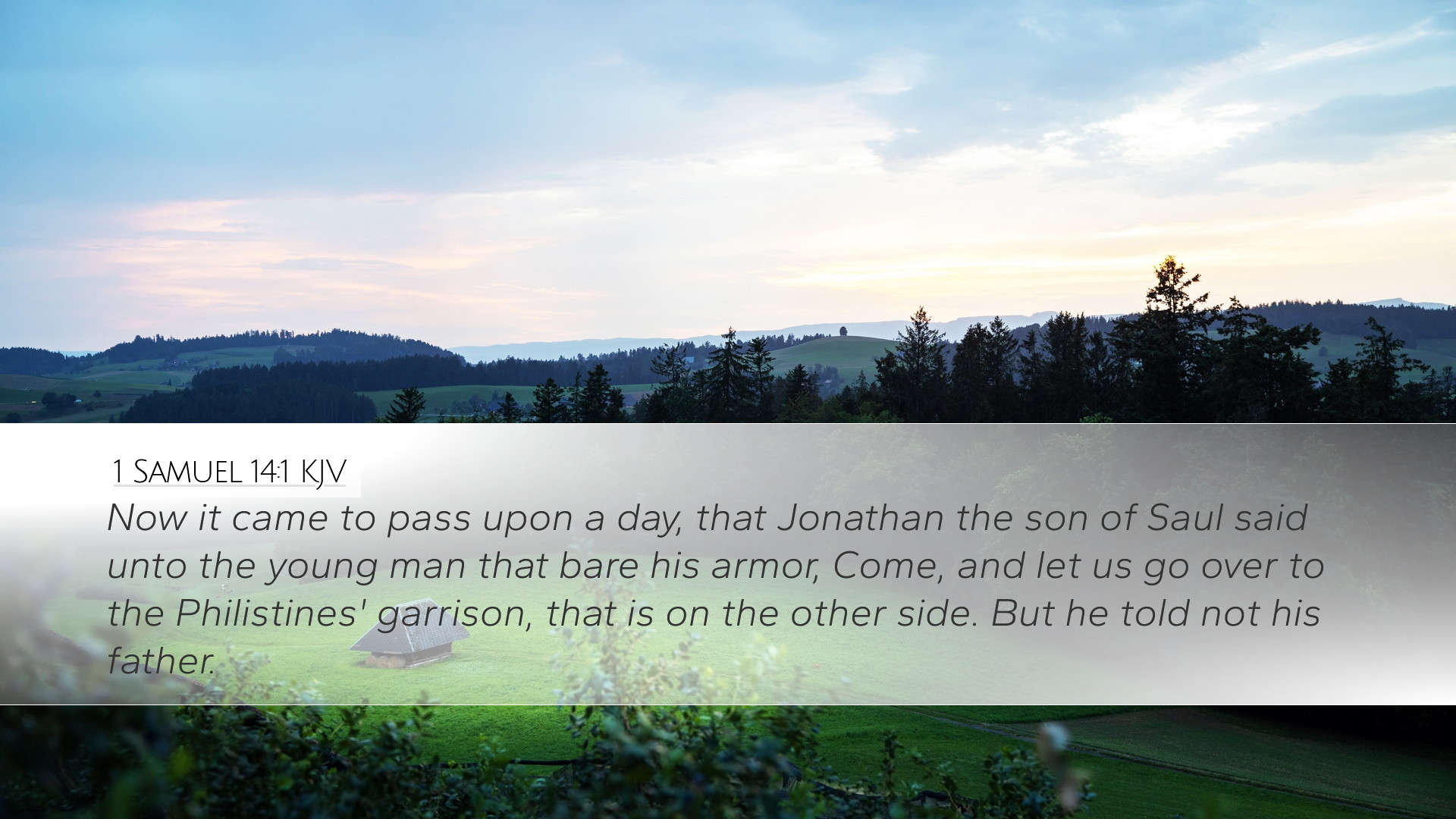Bible Commentary on 1 Samuel 14:1
Verse: "Now it came to pass upon a day, that Jonathan the son of Saul said unto the young man that bare his armor, Come, and let us go over to the Philistines’ garrison, that is on the other side. But he told not his father."
Introduction
The narrative in 1 Samuel 14 marks a significant turning point in the history of Israel during the Philistine oppression. This verse introduces the bold and courageous character of Jonathan, the son of King Saul. The examination of this passage provides layers of theological insight and practical applications for contemporary believers, enhancing the understanding of divine providence, faith, and leadership.
Insights from Various Commentaries
Matthew Henry’s Commentary
Matthew Henry highlights Jonathan's initiative and the underlying motivations that propelled him toward the Philistine garrison. He points out that Jonathan’s courage was possibly rooted in his faith in God and his disdain for the oppression of the Philistines. Jonathan’s desire to act without informing his father indicates a possible disconnect with Saul’s leadership, which may have been characterized by fear and hesitation.
- Courage and Faith: Henry emphasizes that true courage, especially in spiritual battles, must be infused with faith. Jonathan’s action represents a reliance on God’s will rather than a personal lust for glory.
- Leadership Styles: The contrast between Jonathan and King Saul is a theme noted by Henry, showcasing differing leadership qualities. Jonathan takes initiative and actively seeks to alleviate the plight of Israel, whereas Saul’s decisions are more reactionary and fearful.
Albert Barnes’ Notes
Barnes provides a detailed exploration of the strategic implications of Jonathan's venture. He notes that Jonathan’s decision to confront the Philistines alone with his armor-bearer illustrates a great act of faith, significant in the context of the Israelite's military standings.
- Strategic Initiative: Barnes remarks that Jonathan’s choice to take action stems from recognizing the necessity of confronting evil forces, even when the odds seemed insurmountable. His readiness to confront the Philistines is indicative of a leader who sees beyond present circumstances.
- Divine Providence: Barnes also touches upon the sovereignty of God in guiding this encounter. Baptizing the action in faith, he suggests that Jonathan believed that God could deliver Israel regardless of human reasoning or military might.
Adam Clarke’s Commentary
Clarke highlights the significance of Jonathan's personal relationship with God, which evidently fueled his boldness. He posits that Jonathan’s armor-bearer’s role was not merely supportive but pivotal, symbolizing the importance of companionship in undertaking God’s work.
- Partnership in Faith: Clarke underscores the role of Jonathan’s armor-bearer, whose willingness to follow Jonathan’s lead speaks to the value of supportive relationships in spiritual endeavors. Their unity reflects the principle that teamwork is crucial when pursuing God-given missions.
- Concealment From Authority: Notably, Jonathan did not inform Saul of his plans. Clarke implies that this highlights a necessary discernment in leadership — recognizing when to act independently of potentially ineffective authority for the sake of righteousness.
Theological Reflections
This verse invites profound theological reflections on faith, courage, and divine assistance. Only God can guide the seemingly insignificant acts of faith to monumental outcomes. It serves as a reminder that, irrespective of circumstances, God can use those who are willing to act according to His plans.
The Role of Faith in Action
It is also crucial to emphasize the theme of taking action in faith. Jonathan’s bravery is not merely for personal glory; rather, it is a demonstration of trusting in God’s providence. Pastors and scholars might draw parallels to the New Testament teachings on faith that moves mountains and the encouragement found in James about faith complemented by works (James 2:17).
Leadership Lessons
From Jonathan's character, we glean essential leadership lessons such as:
- Initiative: Effective leaders take the initiative rather than waiting passively for circumstances to change.
- Courage: Leadership often requires stepping into uncertainty with faith in God’s deliverance.
- Listening to God Over Men: It may sometimes be necessary to prioritize obedience to God above adherence to earthly authority when those in authority oppose divine action.
Practical Applications for Today
In a modern context, this verse challenges contemporary believers to reflect on their own readiness to act against injustice, oppression, and spiritual battles at hand. It invites pastors and theologians to consider how they might encourage congregations to:
- Cultivate Faith: Fostering a culture where members can share their faith stories and testimonies of God’s guidance in their lives.
- Stand Courageously: Equipping believers to respond to the crises of the day with courage and initiative, modeling their lives after figures like Jonathan.
- Encourage Community: Emphasizing the importance of supportive relationships within the faith community as seen in Jonathan’s connection with his armor-bearer.
Conclusion
In summary, 1 Samuel 14:1 illustrates a pivotal moment within Israel’s history where faith, bravery, and divine intervention align, leading toward decisive action against formidable foes. By exploring insights offered by influential commentators, we unveil core themes that extend beyond the text into the lived experience of faith today. This narrative encourages individuals to embrace their roles as active participants in God’s transformative work in the world.


